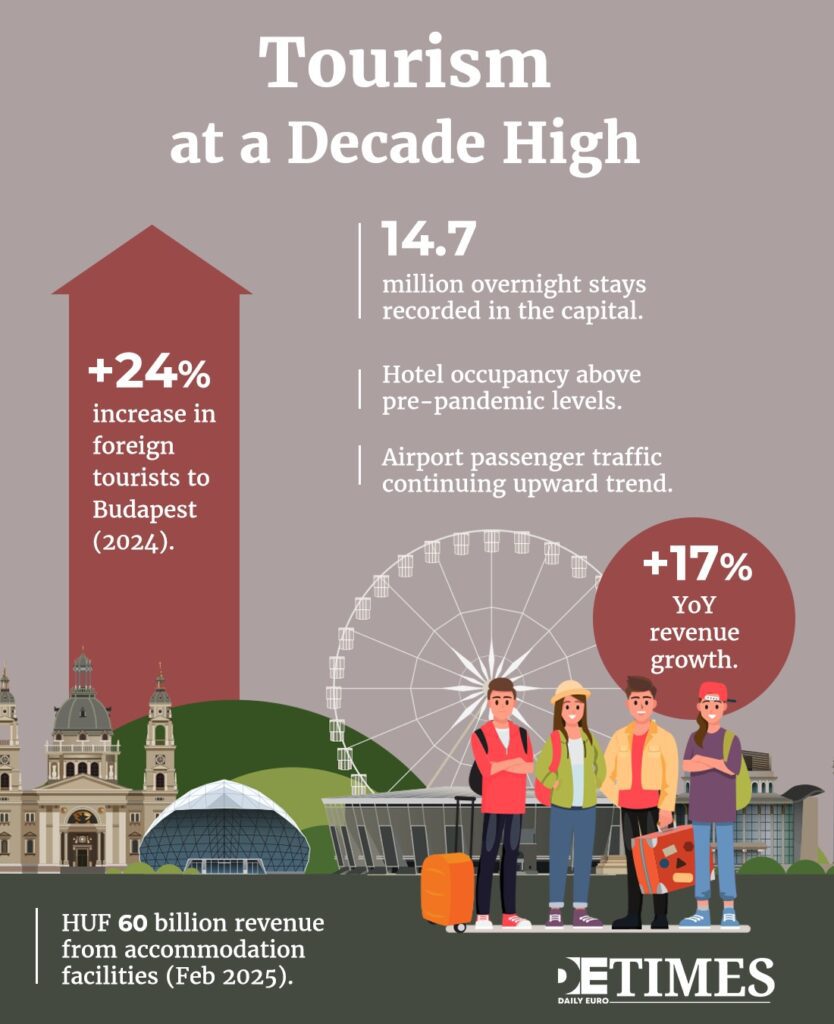Hungary is welcoming more visitors than at any point in the last decade.
Budapest recorded a 24% increase in foreign tourists in 2024, with 14.7 million overnight stays in the capital. Hotels report occupancy rates above pre-pandemic levels, and airport traffic continues to grow.
February 2025 saw tourism revenue from accommodation facilities reach nearly HUF 60 billion, a 17% year-on-year increase.
This success has clear economic benefits. Tourism supports thousands of jobs and boosts the hospitality sector. Yet the rapid increase in visitors has intensified pressure on Budapest’s housing market at a time when young residents already struggle with rising costs.
Prosperity for Whom?
The question is not whether tourism helps Budapest’s economy. It does. The question is who benefits most and who pays the price.
Rental prices in central districts have climbed sharply, with some areas showing rental yield increases of 5.5%.
The growth of short-term rentals is widely seen as one driver, with apartments once available to residents now being converted into holiday properties.
Budapest is debating restrictions similar to those seen in Lisbon, Prague and Barcelona, where local governments have launched measures to protect long-term housing stock. Yet the political landscape makes agreement difficult, and enforcement remains uneven.
A City Transformed
Budapest’s identity has long depended on its local life.
The cafés, alternative music venues and literary spaces that define the city all rely on residents who can afford to remain in their neighbourhoods. When rents escalate, this cultural ecosystem weakens.
Tourism transforms the economy, but it also transforms the purpose of a city. When a place becomes designed for visitors first, the people who give it character risk being pushed to the margins.
The average cost of a new apartment in Budapest rose to HUF 79 million in 2024, up by HUF 7.9 million from 2023.
Foreign real estate buyers increased by 36% since 2020, drawn by the weakening Hungarian Forint and the city's growing international profile.
Properties are booked for short-term stays an average of 274 nights a year, showing just how lucrative the holiday rental market has become. On average, hosts in Budapest see annual earnings of around €18,000 from these rentals.

A Global Pattern
Hungary’s experience echoes challenges seen elsewhere.
Istanbul’s historic districts, long admired for their character, have seen similar pressures. Neighbourhoods such as Cihangir and Balat now face rent increases linked to foreign investment and short-term tourist stays. This causes tension in efforts to preserve heritage while managing commercialisation.
Marrakech offers another version of the same trend. The popularity of the medina and riads has generated growth, yet local families find it harder to remain in central areas. Tourism becomes both a source of income and a challenge to social stability.
These comparisons display a shared dilemma. Tourism can revive neighbourhoods, but without careful planning it can also price out the very communities that sustain local culture.
Searching for Solutions
Several Hungarian municipalities are exploring responses.
Ideas include limits on short-term rental days, incentives for long-term leases, and support for affordable housing projects. These measures follow broader European debates on how to protect residents without discouraging visitors.
The difficulty lies not in tourism itself but in how it expands. A city thrives when locals and visitors coexist, when economic benefit does not erode cultural life, and when growth does not turn into displacement.
Budapest stands at that crossroads. Its tourism peak reflects global recognition, yet its housing pressures expose a more fragile reality. If Hungary can address both sides, the country may preserve not only its economy, but also the local life that makes its capital worth visiting.
Keep up with Daily Euro Times for more updates!
Read also:
Tourists Under Fire: Europe’s North-South Economic Divide Alight
Spain’s Digital Nomads: The Paradox of Remote Working
Sanctions, Fees, and Excuses: Hungary’s Energy Ties to Russia Under Fire






